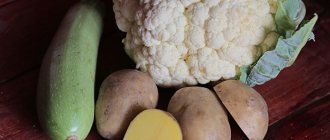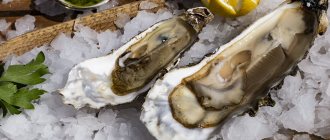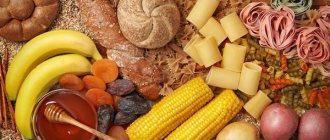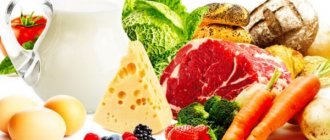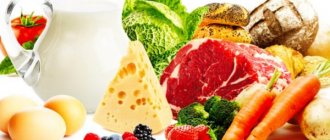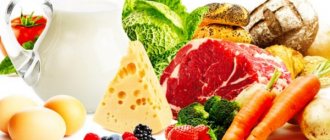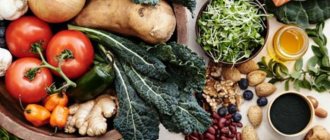Meat
All types of meat contain almost no carbohydrates. The only exception is parts such as the liver, which contains about 5% carbohydrates.
Beef (zero)
Beef is filling and rich in important elements such as iron and B12. There are dozens of ways to prepare it, from ribs to ground meat and cutlets.
Carbohydrates : zero
Lamb (zero)
Like beef, lamb contains a lot of nutrients, iron and B12. Because the animal is often grass-fed, the meat often contains an essential fatty acid called conjugated linoleic acid, or CLA (14).
Carbohydrates : zero
Chicken (zero)
Chicken is one of the most popular foods on earth. It contains many useful substances and is an excellent source of protein.
If you're on a low-carb diet, you may want to opt for fattier cuts like wings or thighs.
Carbohydrates : zero
Pork, including bacon (usually zero)
Pork is another delicious type of meat, and bacon is a favorite of many low-carb dieters.
Bacon, however, is a processed meat, so it hardly qualifies as a “health food.” However, on a low-carb diet it is quite acceptable to eat a moderate amount.
Most importantly, try to buy bacon from retailers you trust, make sure it doesn't contain artificial additives, and don't overcook the meat when cooking.
Carbohydrates : zero. But read the label carefully and avoid smoked or sugar-cured bacon.
Jerky (usually zero)
Dried meat is meat that has been cut into thin pieces and dried. And, as long as there is no added sugar or artificial additives, it can be a great addition to a low-carb diet.
However, we should not forget that what is sold in stores is often highly processed and is no longer healthy food. Therefore, it is best to make such meat yourself.
Carbohydrates : depends on the type. If it's just meat with seasoning, then approximately zero.
Fish and seafood
Fish and other seafood are generally very nutritious and healthy.
They are especially high in vitamin B12, iodine and omega-3 unsaturated fatty acids, which are elements that many people lack in their diets.
Like meat, almost all fish and seafood contain almost no carbohydrates.
Salmon (zero)
Salmon is one of the most popular fish among health-conscious people, and for good reason.
It is an oily fish, which means it contains significant reserves of heart-healthy fats, in this case, omega-3 unsaturated fatty acids.
Salmon is also rich in vitamin B12, D3 and iodine.
Carbohydrates : zero.
Trout (zero)
Carbohydrates : zero.
Like salmon, trout is a type of fatty fish rich in omega-3 unsaturated fatty acids and other important elements.
Sardine (zero)
Sardine is a fatty fish that is usually eaten almost entirely, bones and all.
Sardine is one of the most nutrient-dense fish on the planet, and contains almost everything the human body needs.
Carbohydrates: zero.
Shellfish (4-5% carbohydrates)
Unfortunately, shellfish find their way into our daily diet much less often than they deserve. However, they are on a par with the healthiest products in the world, and in terms of nutritional richness they can compete with meat from internal organs.
Shellfish typically contain small amounts of carbohydrates.
Carbohydrates : 4-5 grams of carbohydrates per 100 grams of shellfish.
What does 20 grams of carbohydrates look like?
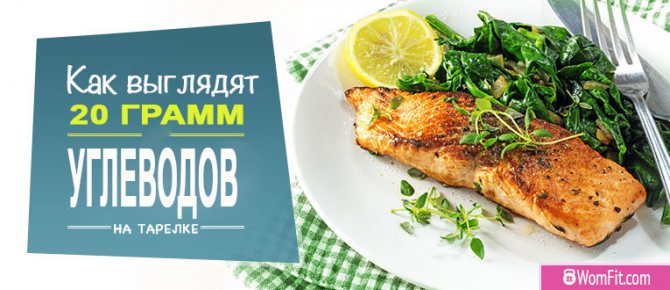
For example, a meal consisting of 4 ounces of roasted pork tenderloin, ½ plate of spinach and ⅔ plate of sweet potatoes contains about 20 grams of carbohydrates, which is just one meal. One serving of fruit or vegetables - about 15 g of carbohydrates; One serving of dairy provides about 15 grams of carbohydrates at the absolute minimum.
So on this diet, you'll consume very small amounts of fruits, vegetables, dairy, and grains—four of the five recommended food groups. As a result, you'll eat mostly protein and fat rather than processed, junk food. If this is not something you want every day, then this meal plan is not for you.
Vegetables
Most vegetables contain almost no carbohydrates, especially leafy greens and cruciferous vegetables, since almost all of their carbohydrates are found in fiber.

On the other hand, starchy root vegetables such as potatoes and sweet potatoes are rich in carbohydrates.
Broccoli (7%)
Broccoli is a delicious cruciferous vegetable that can be cooked or eaten raw. It's high in vitamin C, vitamin K, fiber, and contains powerful plant compounds that may help prevent cancer.
Carbohydrates : 6 grams per cup or 7 grams per 100 grams.
Tomatoes (4%)
Technically, tomatoes are berries, but they are classified as vegetables. They have a lot of vitamin C and potassium.
Carbohydrates: 7 grams in a large tomato or 4 grams per 100 grams.
Onion (9%)
Onions are one of the tastiest vegetables on earth and add a vibrant flavor to dishes. It contains a lot of fiber, antioxidants and various anti-inflammatory components.
Carbohydrates: 11 grams per cup or 9 grams per 100 grams.
Brussels sprouts (7%)
Brussels sprouts are an incredibly nutritious vegetable, a relative of broccoli and regular cabbage. Rich in vitamin C, K and many other beneficial elements.
Carbohydrates: 6 grams per half cup or 7 grams per 100 grams.
Cauliflower (5%)
Cauliflower is a tasty and versatile vegetable that can be used to prepare varied and interesting dishes. It is rich in vitamins C, K and folate.
Carbohydrates : 5 grams per cup and 5 grams per 100 grams.
Kale (10%)
Kale or kale is very popular among health-conscious people. It is rich in fiber, vitamins C, K and carotene antioxidants. Among other things, kale in general has incredible health benefits.
Carbohydrates: 7 grams per cup or 10 grams per 100 grams.
Eggplant (6%)
Eggplant is another fruit that is often mistaken for a vegetable. It is rich in fiber and very varied in consumption.
Carbohydrates: 5 grams per cup or 6 grams per 100 grams.
Cucumber (4%)
Cucumber is a common vegetable with a mild flavor. Consists mainly of water with a small amount of vitamin K. [goes well with lard - approx. transl.]
Carbohydrates: 2 grams per half cup or 4 grams per 100 grams.
Bell pepper (6%)
Bell pepper is a well-known vegetable with a distinct, pleasant taste. It is high in fiber, vitamin C and carotene antioxidants.
Carbohydrates : 9 grams per cup or 6 grams per 100 grams.
Asparagus (2%)
Asparagus is a surprisingly tasty spring vegetable. It's loaded with fiber, vitamin C, folate, vitamin K, and carotene antioxidants. It also has a lot of protein compared to other vegetables.
Carbohydrates: 3 grams per cup or 2 grams per 100 grams.
Green beans (7%)
Green beans are technically a member of the legume family, but they are cooked and consumed as a vegetable.
Each bite contains a huge amount of nutrients, as well as fiber, protein, vitamin C, K, magnesium and potassium.
Carbohydrates: 8 grams per cup or 7 grams per 100 grams.
Mushrooms (3%)
Mushrooms, generally speaking, are not plants, but for simplicity, edible mushrooms are classified as vegetables. They contain significant amounts of potassium and some B vitamins.
Carbohydrates : 3 grams per cup and 3 grams per 100 grams (ceps).
Radish
This is a root vegetable with a unique taste. Radishes are rich in vitamins, minerals and antioxidant compounds.
Radishes contain less than 2g of carbohydrates per 100g.
The product has a characteristic tart taste and is usually used in recipes in small quantities. Radishes contain antioxidants, large amounts of potassium, magnesium, phosphorus, improve immunity, and are used in many diets.
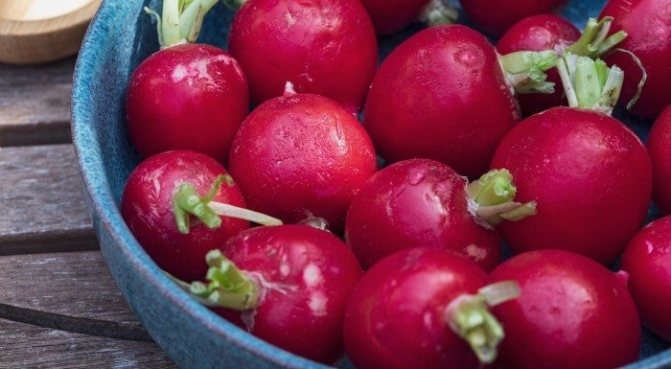
Conclusion
When you're cutting back on carbs, be sure to include a variety of vegetables in your diet to ensure you're getting all the vitamins and minerals you need. These foods contain very few carbohydrates. You can also prepare many delicious dishes from them in different ways. They contain fiber and water, which will keep you feeling full. These healthy plant foods will also provide great health benefits.
Articles on our website are presented for educational and informational purposes only. We do not recommend using article materials as medical advice. If you decide to take dietary supplements or make fundamental changes to your diet, first consult with a specialist.
Translation: Farida Seidova
Fruits and berries
Although the generally accepted opinion about fruit is that it is a healthy food, the attitude towards it among supporters of a low-carb diet is quite contradictory.
And all because fruits sometimes contain quite a lot of carbohydrates compared to vegetables.

Depending on what threshold you have set for yourself, you may need to limit the amount of fruit to one or two per day.
This, however, does not apply to fatty fruits such as avocados or olives.
Low-sugar berries, such as strawberries, are also good for you.
Avocado (8.5%)
Avocado is a unique fruit. Instead of carbohydrates, it is loaded to the brim with healthy fats.
Avocados are high in fiber, potassium, and all sorts of other nutrients.
Carbohydrates: 13 grams per cup or 8.5 grams per 100 grams.
Don't forget that the carbohydrates mentioned (about 78%) are contained mainly in fiber, so there are practically no digestible (“net”) carbohydrates in it.
Olives (6%)
Olives are another delicious fruit that is high in fat. It contains a lot of iron, copper and vitamin E.
Carbohydrates: 2 grams per ounce or 6 grams per 100 grams.
Strawberry (8%)
Strawberries are the lowest carb, highest nutrient fruit you can find on your table. It is rich in vitamin C, manganese and various antioxidants.
Carbohydrates: 11 grams per cup or 8 grams per 100 grams.
Grapefruit (11%)
Grapefruits are citrus fruits related to oranges. They are very rich in vitamin C and carotene antioxidants.
Carbohydrates: 13 grams in half a grapefruit or 11 grams per 100 grams.
Apricot (11%)
Apricot is an incredibly delicious fruit. Each apricot contains some carbohydrates, but also a ton of vitamin C and potassium.
Carbohydrates: 8 grams in two apricots or 11 grams per 100 grams.
Low-carb diet: an overview of the benefits and how it works
Plenty of research shows that for those who make consistent efforts, a low-carb diet is highly beneficial. It's not always necessary to give up all unprocessed, whole sources of carbohydrates (such as the fruits and starchy vegetables mentioned above), but cutting out processed foods, sweeteners, and even grains may benefit you in the following ways:
- Faster weight loss and usually easier to maintain a healthy weight. Since glucose from carbohydrates is no longer available as an energy source, the body will use stored fat in the body instead of the fat and protein consumed through food.
- More satiation from food, decreased hunger and cravings (especially carbohydrate-rich foods and sweets).
- Normalization of blood sugar levels. This is due to better control of insulin and glucose spikes. For a pre-diabetic or diabetic condition, this may be the difference between preventing symptoms or avoiding complications.
- Neuroprotective effects, improved cognitive performance, including reduced brain fog or lack of energy, improved memory later in life, and relief of symptoms of epilepsy.
- In some cases - improved hormonal balance. This often results in improved sleep, less fatigue, relief from pain or muscle weakness, and improved overall tone.
- Reduces bone loss and the risk of developing osteoporosis.
- For athletes, this provides possible beneficial changes in weight and physique, as well as an increase in the relative values of maximum oxygen uptake (VO2 max) and oxygen uptake at lactate threshold (VO2 LT).
- In some cases, the risk of cardiovascular disease or metabolic syndrome is reduced by normalizing blood sugar and bad cholesterol levels.
Wondering what types of foods you should really avoid if you're following a low-carb diet? They're higher in things like sweeteners, flours, and thickeners, so cutting them out will help keep your carb intake low:
- If you want to eat truly low-carb, avoid grains (including wheat, barley, oats, rice and other whole grains). This also applies to all products made from grain flour, such as bread, cakes, cookies, chips, cereals, muffins, pasta, etc.
- Sugar and products containing artificial sweeteners or added sugar (honey, cane sugar, coconut sugar, etc.)
- Most store-bought fruits and fruit juices (with the exception of lime and lemon juice, these have a lot of added sugar)
- Most prepared seasonings, sauces or packet mixes typically contain sugar.
- Alcohol, soda and other sweetened drinks.
- If you want to completely cut out carbs (if you're on, say, a ketogenic diet), also avoid most dairy products, such as yogurt, ricotta, or cottage cheese. High-fat, low-carb cheeses are often included in low-carb diets because they contain very few carbohydrates.
Remember that no matter how many carbohydrates you plan to consume per day, it is helpful to be intentional about consuming more natural foods and fewer processed foods.
It’s best to experiment with an extremely low-carbohydrate diet for a certain period of time, but in the long term (based on how you plan to eat forever), keep in mind that you need to eat a variety of plant foods that contain at least some amount of carbohydrates.
To maintain a long-term therapeutic diet, you need to really understand how many carbohydrates per day, given a balanced diet, you can consume without the risk of gaining weight or developing other health problems. You should use this information about your personal individual biochemistry to help you maintain a balanced diet—one that includes healthy proteins and fats, as well as fresh vegetables, fruits, and even starchy vegetables, legumes, or grains if they suit you.
Nuts and seeds
Nuts and seeds are very popular in low-carb diets. They are usually low in carbohydrates, but high in fat, fiber, protein and various microelements.

Nuts are typically found in snack foods, but seeds are more often used to add texture to salads or other dishes.
Nut and seed flours (such as almond, coconut or flax seed flour) are also used to make low-carb breads and other baked goods.
Almonds (22%)
Almonds are a wonderful treat. It's high in fiber, vitamin E, and one of the world's best sources of magnesium, a mineral that most people are deficient in one way or another.
In addition, almonds cause quick satiety, which, according to some studies, helps with weight loss.
Carbohydrates: 11 grams per ounce or 22 grams per 100 grams.
Walnut (14%)
Walnut is another delicious type of nut. It is especially high in omega-3 polyunsaturated fatty acids, as well as a variety of other nutrients.
Carbohydrates: 4 grams per ounce or 14 grams per 100 grams.
Peanuts (16%)
Peanuts are technically a member of the legume family, but everyone tends to think of them as nuts. It's loaded with fiber, magnesium, vitamin E, and many other important vitamins and minerals.
Carbohydrates: 5 grams per ounce or 16 grams per 100 grams.
Chia seeds (44%)
Chia seeds are gaining popularity among healthy eating enthusiasts. They are loaded to the brim with a variety of essential nutrients and are a great addition to many low-carb recipes.
This is one of the best known sources of dietary fiber that you can find on the shelves.
Carbohydrates: 12 grams per ounce or 44 grams per 100 grams.
Don't forget that about 86% of chia seeds' carbohydrates are found in fiber, so they contain almost no digestible ("net") carbohydrates.
Cauliflower
It seems to be the most popular low-calorie vegetable today. You can substitute cauliflower for many high-carb foods in a variety of dishes. It makes an excellent appetizer raw, but can also be stewed, baked and fried, served as a casserole or as a side dish for dinner. The product contains 1.9 g carbohydrates per 100 g
.
Cauliflower, like broccoli, belongs to the cruciferous family. It is easily absorbed by the body, rich in antioxidants, and contains many vitamins and minerals. This is an essential vegetable for those on a diet!
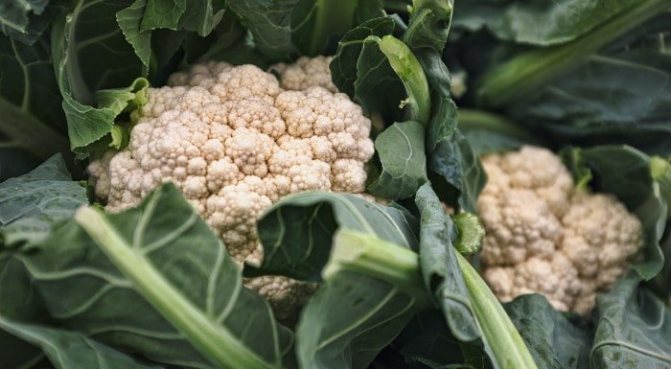
Dairy
If you are not lactose intolerant, then full-fat, low-carb dairy products are for you. The main thing is to pay attention to the label and avoid anything with added sugar.

Cheese (1.3%)
Cheese is one of the tastiest low-carb foods, and you can eat it raw or create a variety of interesting foods with it. It goes especially well with meat, and also as part of a burger (without a bun, of course).
Cheese is also highly nutritious. A piece of cheese contains as many nutrients as a whole glass.
Carbohydrates: 0.4 grams per slice or 1.3 grams per 100 grams (cheddar).
Heavy cream (3%)
Heavy cream is very low in carbohydrates and protein, but high in milk fat. Many low-carb dieters add them to coffee or other dishes. A rosette of berries with whipped cream is a delicious low carb dessert.
Carbohydrates: 1 gram per ounce or 3 grams per 100 grams.
Full fat yogurt (5%)
Full-fat yogurt is an extremely healthy food. Contains the same substances as whole milk, but contains live cultures that provide extremely beneficial probiotic bacteria.
Carbohydrates: 11 grams per 8-ounce container or 5 grams per 100 grams.
Greek yogurt (4%)
Greek yogurt, also called filtered yogurt, is very thick compared to regular yogurt. It is rich in nutrients, especially protein.
Carbohydrates: 6 grams per package or 4 grams per 100 grams.
List of foods that are considered low carb
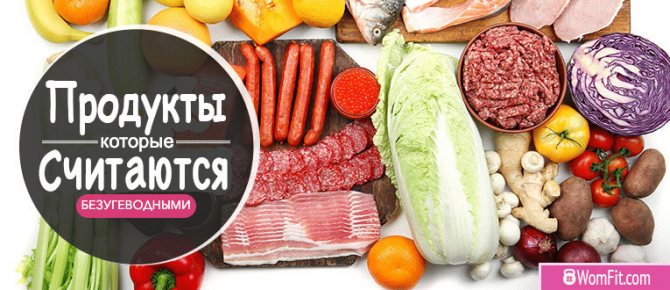
- zucchini
- cauliflower
- curly cabbage
- spinach
- broccoli
- tops
- arugula
- mushrooms
- celery
- tomatoes
- Bell pepper
- olives
- eggplant
- radish
- watercress
- bok choy
- avocado
- strawberries
- fish
- chicken
- turkey
- pork
- roast beef
- eggs
- Oil
- cottage cheese
- full fat greek yogurt
- tofu
Fats and oils
There are many healthy fats and oils that are acceptable on a natural low-carb diet.

Most importantly, avoid refined vegetable oils such as soybean or corn because they are very harmful in large quantities.
Oil (zero)
Butter was once demonized for being rich in fat, but now it is making a comeback on our tables. If possible, choose grass-fed butter because it contains more nutrients.
Carbohydrates: zero.
Extra virgin olive oil (zero)
Extra virgin olive oil is one of the healthiest things you can add to your diet. In addition, this is the product on which the Mediterranean diet is based.
It's loaded with powerful antioxidants and anti-inflammatory elements, and it's also incredibly beneficial for your cardiovascular system.
Carbohydrates: zero.
Coconut oil (zero)
Coconut oil contains healthy fats and medium chain fatty acids, which have extremely beneficial effects on metabolism. Studies show that it helps reduce appetite, helps burn fat and reduce abdominal fat deposits.
Carbohydrates: zero.
Eggplant
Eggplant is the fruit of a herbaceous plant from the nightshade family. It has a dark purple color, but the color of the fruit may vary depending on the degree of ripeness or variety.
Eggplant contains a lot of potassium, which means it has a beneficial effect on the cardiovascular system. It's also high in fiber and water, making it a good low-carb dough substitute in lasagna or dishes that use Parmesan. This is a low-calorie and nutritious product that is included in the menu of many diets. Of course, diets require that eggplants be grilled or steamed, without oil.
Eggplant is a frequently used ingredient in Asian cuisine. Roasted eggplant is the main ingredient in baba ganoush sauce. And also a very tasty dish - vegan masala with eggplant.
Beverages
Most sugar-free drinks are suitable for a low-carb diet.

Keep in mind that fruit juices are very high in sugar and carbohydrates and should definitely be avoided.
Water
Water should be your main drink, regardless of what the rest of your diet is based on.
Carbohydrates: zero.
Coffee
Despite the fact that at some point there was a false accusation about coffee, in fact the drink is very healthy.
It's the best source of antioxidants in the diet, and studies show that coffee drinkers live longer and are at lower risk of serious diseases such as type 2 diabetes and Parkinson's and Alzheimer's diseases.
Most importantly, don't add anything unhealthy to your coffee. Black coffee is best, but coffee with milk or cream is also okay.
Carbohydrates : zero
Tea
Tea, especially green tea, has been extensively studied and has been confirmed to have extremely positive health effects. It also promotes fat burning.
Carbohydrates: zero.
Sparkling water
Carbonated water is just water with carbon dioxide added. So as long as there is no sugar in it, it is completely acceptable. Read the label carefully to make sure no sugar has slipped inside.
Carbohydrates: zero.
Dark chocolate
It may come as a surprise to some, but dark chocolate is actually the perfect low-carb treat.
Make sure it is at least 70-85% cocoa, this will mean there is almost no sugar in it.
Dark chocolate has many health benefits, such as improving brain function and lowering blood pressure. Research also shows that dark chocolate lovers have a much lower risk of heart disease.
You can learn about the health benefits of dark chocolate from this article.
Carbohydrates: 13 grams per 1-ounce bar or 46 grams per 100 grams. Carbohydrate content varies depending on the type of chocolate, so read the label carefully.
Don't forget that about 25% of dark chocolate's carbohydrates come from fiber, so its edible carbohydrate count is even lower.
Herbs, spices and seasonings
There are an endless number of wonderful herbs, spices and seasonings recommended for consumption. Most of them do not contain carbohydrates, but will make your dishes healthy, tasty and flavorful.
Examples of such seasonings include salt, pepper, garlic, ginger, cinnamon, mustard and oregano. In this article you will find 10 wonderful herbs and spices that are also incredibly healthy.
Fully or partially limited products
With a low-carbohydrate diet, the consumption of sugar and products containing it, sweets, baked goods, honey, halva, chocolate, jam, cookies, dried fruits (raisins, dates, figs, prunes, dried apricots), condensed milk is completely prohibited/sharply limited in the diet.
Consumption of white wheat bread, rolls, pasta, gingerbread, waffles, cakes, ice cream, carbonated drinks, sweet dairy products, bananas, grapes, crackers, beer, sweet fruits, milk, caffeine-containing products, sweet and semi-sweet wines, fried potatoes is not allowed. Semolina porridge is prohibited from porridges. Fatty meats, smoked meats, lard, bacon, and juices from sweet fruits are excluded from the diet.
Table of prohibited products
| Proteins, g | Fats, g | Carbohydrates, g | Calories, kcal | |
Vegetables and greens | ||||
| fried potato | 2,8 | 9,5 | 23,4 | 192 |
| radish | 1,2 | 0,1 | 3,4 | 19 |
| turnip | 1,5 | 0,1 | 6,2 | 30 |
| beet | 1,5 | 0,1 | 8,8 | 40 |
Fruits | ||||
| figs | 0,7 | 0,2 | 13,7 | 49 |
Berries | ||||
| grape | 0,6 | 0,2 | 16,8 | 65 |
Nuts and dried fruits | ||||
| raisin | 2,9 | 0,6 | 66,0 | 264 |
| dates | 2,5 | 0,5 | 69,2 | 274 |
Flour and pasta | ||||
| pasta | 10,4 | 1,1 | 69,7 | 337 |
| pancakes | 6,1 | 12,3 | 26,0 | 233 |
| vareniki | 7,6 | 2,3 | 18,7 | 155 |
| dumplings | 11,9 | 12,4 | 29,0 | 275 |
Bakery products | ||||
| buns | 7,2 | 6,2 | 51,0 | 317 |
| wheat bread | 8,1 | 1,0 | 48,8 | 242 |
Confectionery | ||||
| jam | 0,3 | 0,2 | 63,0 | 263 |
| jam | 0,3 | 0,1 | 56,0 | 238 |
| candies | 4,3 | 19,8 | 67,5 | 453 |
| cake | 3,8 | 22,6 | 47,0 | 397 |
| jam | 0,4 | 0,2 | 58,6 | 233 |
| halva | 11,6 | 29,7 | 54,0 | 523 |
Cakes | ||||
| cake | 4,4 | 23,4 | 45,2 | 407 |
Chocolate | ||||
| chocolate | 5,4 | 35,3 | 56,5 | 544 |
Raw materials and seasonings | ||||
| mayonnaise | 2,4 | 67,0 | 3,9 | 627 |
| honey | 0,8 | 0,0 | 81,5 | 329 |
| sugar | 0,0 | 0,0 | 99,7 | 398 |
Dairy | ||||
| condensed milk | 7,2 | 8,5 | 56,0 | 320 |
| cream | 2,8 | 20,0 | 3,7 | 205 |
| fruit yogurt 3.2% | 5,0 | 3,2 | 8,5 | 85 |
Meat products | ||||
| fatty pork | 11,4 | 49,3 | 0,0 | 489 |
| salo | 2,4 | 89,0 | 0,0 | 797 |
| bacon | 23,0 | 45,0 | 0,0 | 500 |
Sausages | ||||
| smoked sausage | 28,2 | 27,5 | 0,0 | 360 |
Fish and seafood | ||||
| fried fish | 19,5 | 11,7 | 6,2 | 206 |
Alcoholic drinks | ||||
| white dessert wine 16% | 0,5 | 0,0 | 16,0 | 153 |
| vodka | 0,0 | 0,0 | 0,1 | 235 |
| cognac | 0,0 | 0,0 | 0,1 | 239 |
| liquor | 0,3 | 1,1 | 17,2 | 242 |
| beer | 0,3 | 0,0 | 4,6 | 42 |
Non-alcoholic drinks | ||||
| cola | 0,0 | 0,0 | 10,4 | 42 |
| coffee with milk and sugar | 0,7 | 1,0 | 11,2 | 58 |
| Pepsi | 0,0 | 0,0 | 8,7 | 38 |
| energy drink | 0,0 | 0,0 | 11,3 | 45 |
Juices and compotes | ||||
| compote | 0,5 | 0,0 | 19,5 | 81 |
| grape juice | 0,3 | 0,0 | 14,0 | 54 |
| * data is per 100 g of product | ||||

